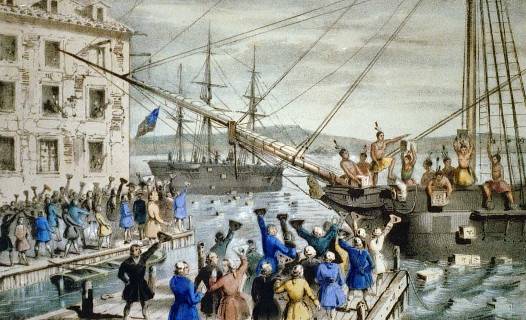We may tolerate a lot, but never absolute tyrants.
We the People ALWAYS have options.
Because THAT'S America.

from History
This famed act of American colonial defiance served as a protest against taxation. Seeking to boost the troubled East India Company, British Parliament adjusted import duties with the passage of the Tea Act in 1773. While consignees in Charleston, New York, and Philadelphia rejected tea shipments, merchants in Boston refused to concede to Patriot pressure. On the night of December 16, 1773, Samuel Adams and the Sons of Liberty boarded three ships in the Boston harbor and threw 342 chests of tea overboard. This resulted in the passage of the punitive Coercive Acts in 1774 and pushed the two sides closer to war.
Under pressure from Patriot groups, the consignees in Charleston, New York, and Philadelphia refused to accept the tea shipments, but in Boston, the chosen merchants (including two of Governor Thomas Hutchinson’s sons as well as his nephew) refused to concede. The first tea ship, Dartmouth, reached Boston November 27, and two more arrived shortly thereafter. Meanwhile, several mass meetings were held to demand that the tea be sent back to England with the duty unpaid. Tension mounted as Patriot groups led by Samuel Adams tried to persuade the consignees and then the governor to accept this approach. On December 16, a large meeting at the Old South Church was told of Hutchinson’s final refusal. About midnight, watched by a large crowd, Adams and a small group of Sons of Liberty disguised as Mohawk Indians boarded the ships and jettisoned the tea. To Parliament, the Boston Tea Party confirmed Massachusetts’s role as the core of resistance to legitimate British rule. The Coercive Acts of 1774 were intended to punish the colony in general and Boston in particular, both for the Tea Party and for the pattern of resistance it exemplified.
No comments:
Post a Comment